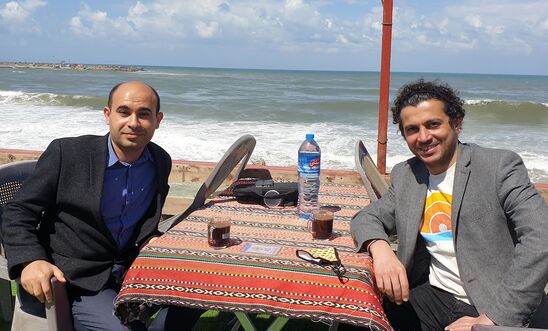
The Gaza Deja vu

By Ahmed Masoud - @masoud_ahmed
20 May 2021
Rolling news humming in the background, constant work messages, endless Whatsapp notifications, phone calls to family in Gaza, a blizzard of Twitter, Facebook and Instagram posts. Is there a ceasefire? Not today, but perhaps tomorrow or in the next few days. Have I been here before? What year is it? 2021 or 2014? Or is it even 2008? I can't figure it out anymore. I'm so tired.
As I sit here in London, restless, anxious, and hundreds of miles away from my family in Gaza, I worry as the night-time approaches. The late hours are not a time to relax; they're when the Israeli bombing intensifies. I receive voicemails from my sister Hind, crying as she fears for her life. She is desperate to protect her children, Mais, Maisara, and Sham.
I stay up all night speaking to my family members, trying to comfort them. My brother Tareq tells me of all the happy places I went to during my last visit in March this year. He tells me these places have all been bombed or damaged in the attacks. I cry in silence when I hear my favourite café by the beach, the Maldives Café, was destroyed, but I don't tell him that. It's minor in comparison to the trauma they exist within.
I say that we will have a new café soon with a better view and tastier coffee to lighten the mood. But I mourn the loss of that happy place and the beautiful memories now buried under the rubble.
I worry for young people in Gaza who found that space a haven. The Maldives Café was a typical coffee house like any other you would find in a Mediterranean city. It had Wi-fi which connected people to the outside world. Thanks to a generator, it had 24 hours of electricity, unlike the 4 hours of power a day people usually get at home due to Israel's cruel blockade.
My family in Gaza can't sleep at night. The sound of bombs shakes their homes. They don't know if their home will be next. Sometimes they have to go out on the street, which can be safer if bombs are hitting nearby houses. My parents eventually left the family house in Jabalia Town to stay at my brother's place in the middle of Jabalia Camp, hoping it would be less likely to be bombed. Sometimes my sister joins them. She has to leave before night time to get there in daylight when there is public transport available. And I sit here in London trying to help coordinate this complex operation. My work and my family here in London undoubtedly suffer.
I don't want to go to sleep. I don't know what I will wake up to see. But I do, and when I do wake up, the first thing I do is check the news, scrolling through the names of people killed and injured. I'm sorry and ashamed to say I exhale a sigh of relief when I see my family has survived another heavy night of Israeli bombardment.
I take a walk on the streets of London to try to clear my head. Many people are excited about the lifting of lockdown and seemingly oblivious to the horrors way over in Gaza. People are enjoying sitting inside cafes again, hugging, chatting, drinking. I stand outside one restaurant like a ghost, wondering whether people in Gaza will ever be able to do that. When will we be free to celebrate the end of 15-years of a crushing lockdown?
I have to get back to work. I try to not stare blankly at all the work emails and excel sheets. Of course, the news is on, but all I hear is an Israeli official spouting 'Hamas, Hamas, Hamas'.
No one in this news interview talks about Sheikh Jarrah and how Israel consistently tries to ethnically cleanse an entire people. No one talks about the decades of Israeli occupation and oppression. No one talks about millions of refugees that are cramped in camps in Palestine and outside. No one talks about when this latest assault on Gaza will end, and the tiny strip will go back to just being under siege with rationed food, water and electricity. No one talks about Palestinians having to apply for so many permissions to cross checkpoints and travel – even if they are injured or ill, and the fact that they might die in Gaza or the West Bank before they are allowed to leave. No one talks about a journey to visit my family that takes me 2-3 days to travel from Cairo to Gaza, through countless humiliating checkpoints as our airport and seaport have been destroyed and blocked by Israel for years. No one talks about the denial of Gazans to travel into Israel, from where 70% of us were made refugees. They only want to talk about Hamas - as if the history of our catastrophic suffering started with them.
But now, another workday ends, and I get ready for another night of terror. I worry this might be the night that changes my life forever, in which I will suffer a massive loss. I brace myself and start to think about all that I should have said to my Mum and all the times I didn't spend with her. And I regret being here, so far away in London.
Ahmed Masoud is the author of the acclaimed novel Vanished - The Mysterious Disappearance of Mustafa Ouda. Ahmed is a writer and director who grew up in Palestine and moved to the UK in 2002.
For more information, please visit www.ahmedmasoud.co.uk
Our blogs are written by Amnesty International staff, volunteers and other interested individuals, to encourage debate around human rights issues. They do not necessarily represent the views of Amnesty International.
0 comments